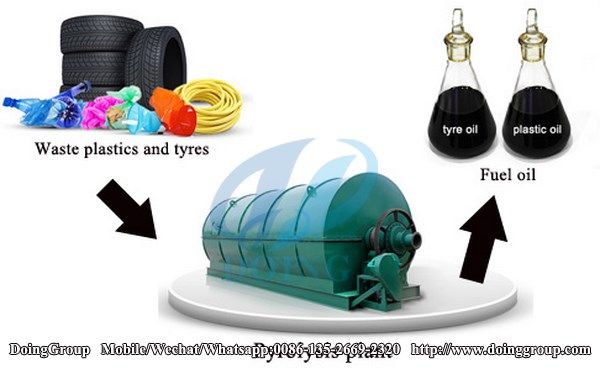Description
The scrap plastic pyrolysis plant manufactured by
DoingGroup adopts the latest pyrolysis technology, which aims
at converting waste plastics into pyrolysis oil, carbon black and
steel wire without any pollution.
The working process of scrap plastic pyrolysis plant is described
as follows:
1. Put the waste plastic into the reactor.
2. Heat the reactor by using fuel materials, such as coal,
charcoal, fuel gas, wood etc. The reactor will be slowly heated,
when the temperature reaches around **0 degree, the oil gas will be
produced.
3. A part of oil gas will go to the condensing system to form
liquid oil. We adopt new-type tubular condenser which can improve
the oil yield efficiency. The gas which can not be liquefied
under normal pressure will go back to combustion system. It can be
used as fuel material to heat the reactor, which will save energy
for the scrap plastic pyrolysis plant.
4. After finishing oil production, the temperature of reactor will
be down. At the same time, we can get carbon black and steel
wire.
5. Lastly, the smoke produced from reactor can achieve national
emission standard after being processed by the dedusting
system.
Application of the end products from scrap plastic pyrolysis plant
:
Pyrolysis basically involves the thermal decomposition of the
plastic at high temperatures (*****0°C) in an oxygen-free
atmosphere. Through the plastic pyrolysis plant, waste plastics can
be effectively recycled into plastic oil, carbon black and steel
wire.
Both the fuel oil and the carbon black produced by the cracking
process can be directly marketed. If you want to get higher market
value, you can further process them ,and we have specialized
equipment for this,waste oil to diesel refining machine ,carbon
briquetting machine and carbon grinding machine. Fuel oil can be
refined to light diesel oil, carbon black can be made into carbon
black pellets for combustion, or milling to carbon black fine
powder, used in the production of plastics, rubber soles, paints
and so on. Non-condensable gases can be recovered as
fuel heating the reactor, which saves fuel costs.
